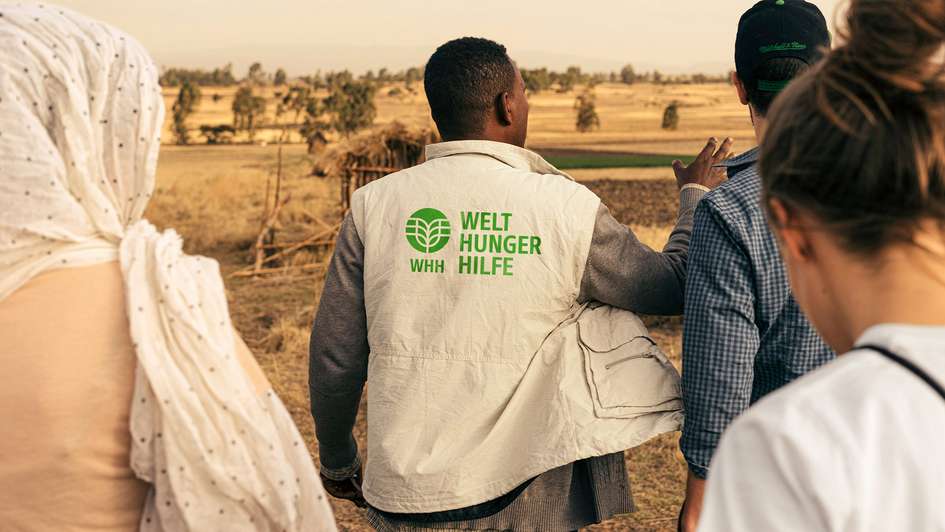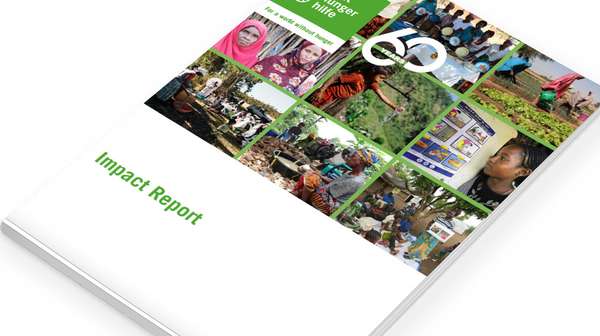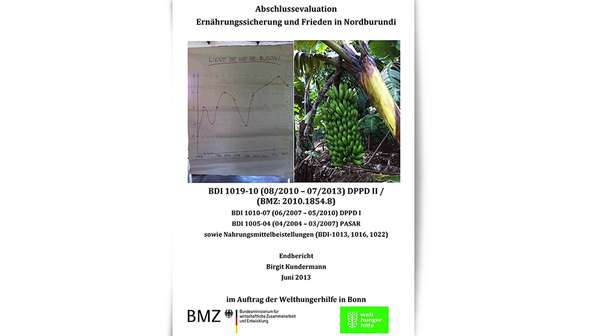A report on Welthungerhilfe`s global outcomes and impact.
Quality management
Learning from successes and mistakes: how gearing towards desired changes and reflecting on successes and failures can help the organization progress.

The meaning of quality
Project work quality – for Welthungerhilfe (WHH) that means:
- “Bringing about changes together”: defining and assessing the desired impacts of the project (the goals) together with project participants, above all with the people whose living conditions are to be changed. Ideally both WHH and the project participants should learn in the process, improving their ability to design the project and improve living conditions.
- Creating the conditions for participation: WHH wants to allow the people it supports to pro-actively contribute to the change processes that affect their lives. The organisation uses various methods to achieve this: establishing institutional forums for participation; ensuring access to relevant information; communicating transparently; and seeing complaints not as a taboo but as an opener to dialogue.
- Using “Impact” as a lighthouse and yardstick: Focusing on desired impacts when planning projects and assessing and reflecting on their progress. WHH also aims to meet further quality standards, such as project implementation sustainability, and gearing plans to the needs of the people it supports.
- Highlighting strengths, boldly detecting and rectifying weaknesses: Experiences are reflected on critically and systematically, to learn both from successes and failures, and to improve.
- Being accountable: Was the plan implemented and goals achieved as intended? What about efficient use of resources, sustainability and relevance? WHH believes it has a duty to donors, institutional donors and project participants to answer these questions.
A collection of quality management documents WHH is committed to.
How to maintain and improve quality?
As early as the project planning stage, WHH draws on previous experience from project monitoring or evaluations of similar projects.
The starting point for project planning is to identify problems and opportunities with affected people on the ground, and to develop project ideas with the aim of improving or stabilizing the situation on the ground in the medium or long term. Where necessary, these project ideas are further discussed with the relevant specialist departments at the head office, partly to anticipate possible negative impacts and to integrate counter-measures into the project.
Project plans go through a standardized internal approval process, before the institutional donors give their opinion about the quality of the plan once more. Even at the planning stage, the focus is on impacts. It is also being established at the planning stage how these impacts should be observed and documented, so material is available later for consideration of any corrective measures that may be needed. This lays the foundation for good monitoring and evaluation.
What impact orientation means for WHH
Improving the lives of those living in poverty is WHH's top priority. For example, it is not just about offering project activities such as “training smallholders in climate-adapted cultivation methods” – but it is crucial to what extent that newly acquired knowledge is then used. Because the ultimate goal is to sustainably improve the nutrition of smallholders and their families. What matters is impact, not just the services provided in the projects.
Monitoring and evaluations not only capture the extent to which the intended impact has been achieved, but also to what extent the work has contributed to the achievement of the goal. Taking into account the respective project context, it is possible to deduce what works and what does not.
How do monitoring and evaluation work?
Monitoring and evaluation are an integral, standardized part of WHH's efforts to constantly improve the quality and impact of its work. Monitoring primarily involves detailed reflection on the question of goal attainment, and it is a tool to be used within projects. Evaluation involves monitoring impacts and considering further evaluation criteria (relevance, efficiency, sustainability, effectiveness) through assessment by independent expert evaluators, during a project or when it ends.
Evaluation results must come from appropriate, scientific methods, and they must be based on comprehensible data and statements from participants. Evaluations provide recommendations for how a project can be improved. Participants, partners, on-site staff and specialist departments at head office then critically examine the recommendations together. The recommendations are implemented as quickly as possible and integrated into the planning of future projects.
Monitoring and evaluation include considerations whether the planned effects are accompanied by any undesired or even negative effects, and how these can be countered in the remaining project period or in subsequent projects.
To meet the requirements of learning and accountability, the results of the monitoring and evaluation are documented and analysed in appropriate forums, to suit the purpose and context. Publishing summaries of all evaluation reports is vital for accountability and transparency.
Ethically responsible project work
WHH's work involves very vulnerable people, often in fragile contexts, so the organisation places a particular emphasis on ethical responsibility in planning, implementation and evaluation.
This requires critical reflection and a clear framework for the conduct of staff. This also means giving people involved in the project the option of complaining.
The CHS (Core Humanitarian Standard) is the international standard for quality assurance through accountability to populations involved in projects. The CHS includes:
- Involving project participants in planning, implementation and evaluation of projects
- Transparent communication about the organisation (what it stands for, where the money comes from) and its work (what it is planning to do, how long it will stay)
- Providing complaint mechanisms (in case the project is not going well, it is not worthwhile, or unethical staff conduct is observed).
WHH is a founder member of the CHS Alliance.
Who carries out quality management?
The country offices carry out quality management for projects. The role of the head office is to provide expert advice, and to produce work tools and standards for M&E and accountability.
Further strategic evaluations are carried out at the head office. The subjects of strategic evaluations depend on the decisions that WHH currently needs to make. Meta-evaluations also take place regularly: How well are monitoring and evaluation working? Can the accountability be improved?
The head office also has an important quality management role in terms of monitoring the entire organisation and producing information shown through standard indicators.









